 |
|
|
 |
| EZLoop®
Networks
From a traditional telco systems point of view, owners/operators
interested in upgrading and
expanding their systems face several challenges:
Extensive technological expertise and the necessary
infrastructure are required for conventional architecture. |
Wireline T-1 costs are prohibitive to all but
the highest-end customer, and the installation
time required
for wireline T-1 cable is lengthy. |
Fiber-optic cable is extremely expensive to
deploy, especially over the "last mile"
to the customer’s site
location. Single users rarely are able to justify
such a cost. |
The distance from the customer’s site
to the telephone company’s central office
limits the use of DSL.
Typically, the end-user must be within 5 kilometers
of the central office. |
Cable TV systems are also short-range systems,
limiting their deployment. Several users simultaneously
accessing the same cable system limits the bandwidth
available to each user. |
Satellite systems are hampered by problems
with latency, line-of-sight access, backhaul availability
and real estate logistics. |
As a solution to the above challenges,
particularly last-mile connectivity, which is invariably
the toughest hurdle to negotiate,
Teletronics offers its EZLoop® system in various
configurations. EZLoop® wireless systems and solutions
provide many of
the telecommunication applications in an architecture
that resolves such ongoing and pressing issues in the
ever-changing
world of business as cost, connectivity, scalability
and versatility.
|
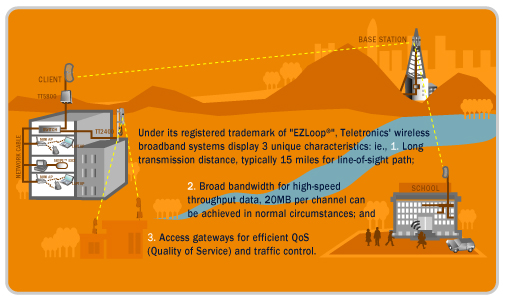
|
Teletronics' EZLoop® Wireless
Systems and Solutions Examples:
|

|

|

|
|
EZLoop® Network Versatility (Click
on the diagram to enlarge)
The following diagram illustrates the versatility of
Teletronics' applications, systems and solutions. Easy
to implement,
EZLoop® systems have been deployed in cities, oil-fields,
mines, schools banks, surveillance posts, along riverbanks,
and at other locations around the world.
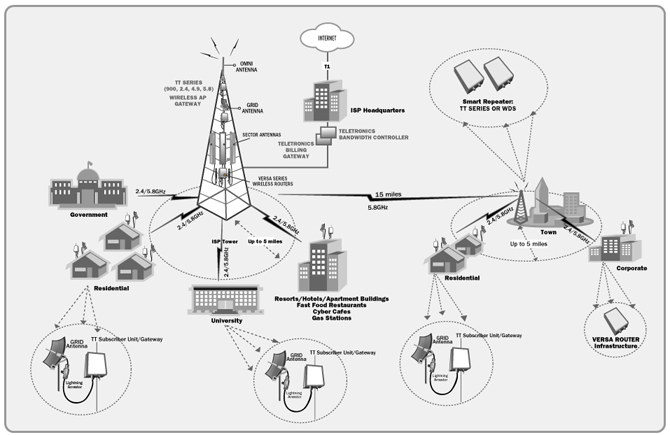
Teletronics’
work tasks to commission a network include: |
Performing a customer needs assessment, fully
matching system specifications to desired commercial
performance. |
Performing the necessary propagation analysis
and conducting a site survey. |
Designing a wireless broadband network that
both complements the customer's near-term operations
and is
scalable to the customer’s long-term growth
expectations. |
Installing, integrating, testing, calibrating,
and optimizing the system. |
Providing training courses for operation and
maintenance; and carrying out system maintenance
and support services. |
Providing warranties; repairing or replacing
defective warranted equipment; and offering dial-up
network management and performance assistance. |
EZLoop® System High Level Design (Click
on the diagram to enlarge)
The diagram below is a typical, high-level graphic illustration
that Teletronics' engineers/architects often provide
to its new
customers after their initial inquiry. The first inquiry
itself can be a simple telephone call, followed by a
few email exchanges
to clarify general environment details, user requirements,
telco trunk-line availability, subscriber distributions,
and other such
matters. Teletronics would then prepare the illustrative
design along with a ball-park cost estimate. Subsequent
on-site survey,
detail design, feature/function specification, pricing
and implementation scheduling would all follow in turn.
At Teletronics, we understand that finance and operational
management are major concerns for every broadband project,
and will work with you
in developing a network to suit your needs. We like
to think of Teletronics as a strategic partner of our
customers in their wireless broadband projects.
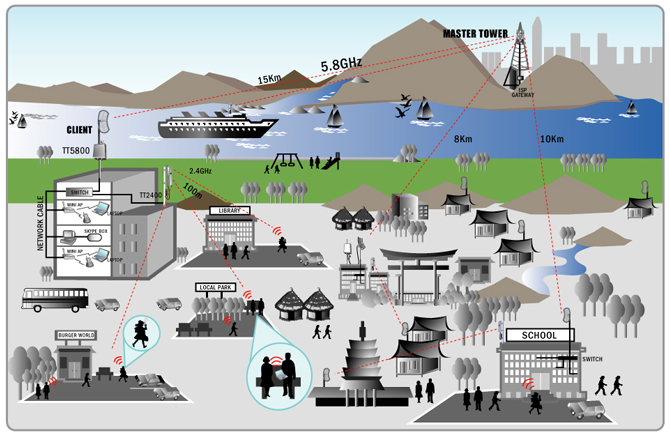
Teletronics' systems can be implemented at 900MHz, 2.4GHz,
5.8GHz or even at 4.9GHz (Public Safety Band) for voice,
data, and video under network configurations for various
applications. For a commercial project, the entire network
can have
system-wide billing and bandwidth control routers as
well as local (subscriber-end) access routers which
effectively isolate
and maximize local traffic. The entire system would
be designed for security: at the physical layer, there
would be WPA2 for
AES encryption and 802.1x for authentication; and at
layer 2, Mac filtering and Intra BSS security features
would be provided.
By replacing different types of transceivers and matching
software, Teletronics' EZLoop® system can be either
a WiMax
System, a low-cost EZWiMax system, or a low-cost broadband
alternative system. The alternative system uses Turbo
Channels with pooling or conventional 802.11 protocols.
All systems may include Teletronics' QoS technology
which can
meet today's multimedia data requirements applicable
for online interactive, gaming, IPTV, and peer-to-peer
file sharing.
|
Over 100 WISPs in the USA, including
SpeedNet, one of the largest in the country which
offers high-speed
internet and related services to 145,000 subscribers
in Illinois, Indiana, Iowa, Kansas, Nebraska,
Ohio, Oklahoma,
South Dakota and Texas. |
US Defense and governmental agencies who have
designated Teletronics as their specialist for
designing
and manufacturing high-end converters for long-distance
data transmission at proprietary frequencies. |
Native American Reservations and rural communities
with whom Teletronics has contracts to design
and
implement entire wireless networks carrying IP-based
voice, data, and video. |
Numerous point-to-point long-distance low-cost-high-speed
microwave links, including a 20-mile long IP
protocol-based link to support 24mb throughput
data in Nigeria and a 55-mile long link to maintain
12mb in
the USA for Johns Hopkins University. |
Telco institutions in foreign countries, such
as ENTEL in Santa Cruz, Bolivia, a city of over
1 million people, to whom Teletronics supplies
broadband equipment for distributing wireless
internet access to thousands of subscribers. |
School Districts, such as the wireless distance
learning network involving over 60 schools covering
an area of over
300 square kilometers near Nanjing, China. |
Environmental data networks, such as Sonora,
Mexico’s Red Inalambinca wireless broadband
network in the
district of Riego Del Rio Yaqui, which uses Teletronics
equipment exclusively to connect 300 environmental
monitoring posts and several local 2.4GHz hotspots
to 10 links at 5.8GHz providing 54Mb of outdoor
transmission. |
Commercial Chain Stores, such as the WiFi network
of 355 McDonalds® Fast Food Stores covering
the entire
island of Taiwan. |
Hotels and Resorts, such as the Coronado Golf
Resort Hotel and Caesar's Park Hotel® in Panama,
and Marriott's Residence Inn® in Philadelphia
where Teletronics provides total systems including
gateways and billing systems
to local operators for profit-making ventures. |
| 
|
China
Example: Wi-Fi System Locations Coverage |
Back
to Top |
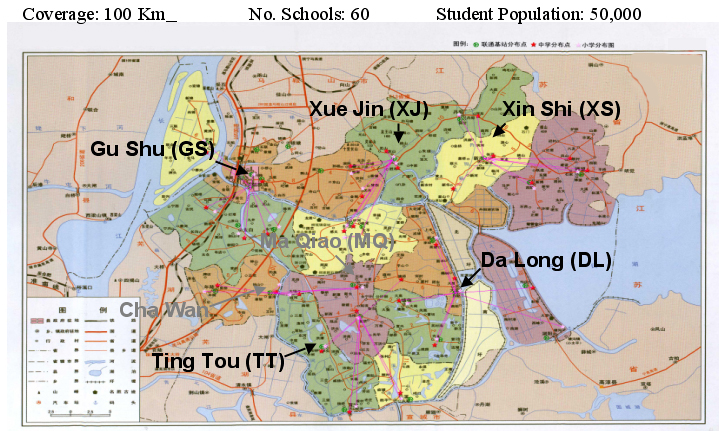
|
|
Standard City Tower Setup 2
|
| 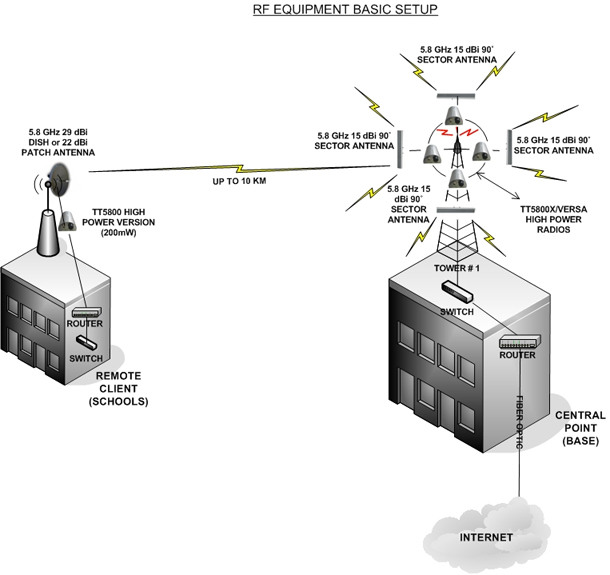
|
|
Installation at Gu Shu
|
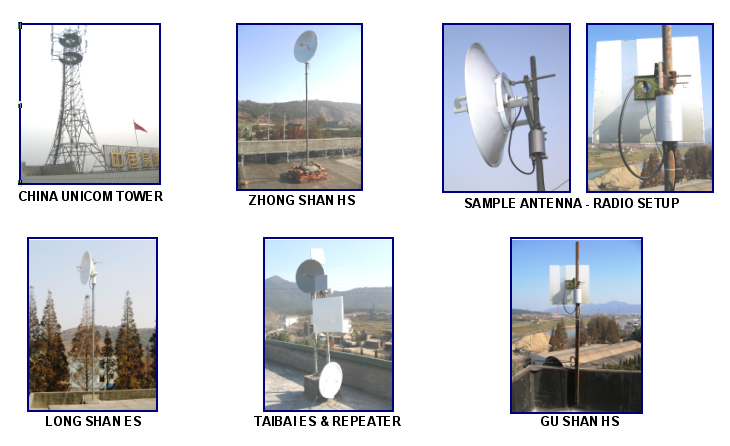
|
| 
|
Bolivia
Examples: Entel S.A. Wi-Fi System Cities |
Back
to Top |
|
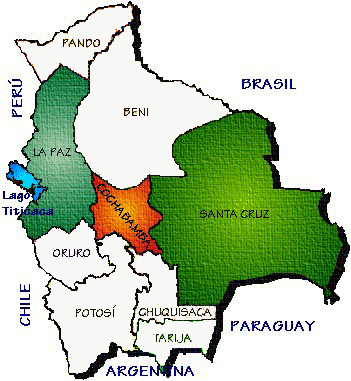
|
Santa Cruz:
Population: 1.2MM Citizens
Coverage: 60 Km(2)
Build Time: 6 months (Towers)/ 3 Years (Clients)
23 Wi-Fi Towers with 3 Base Stations each
Wi-Fi Subscribers/Clients Stations: 4,140
Cochabamba:
Population: 835K Citizens
Coverage: 120 Km(2)
Build Time: 5 months (Towers)/ 2 Years (Clients)
16 Wi-Fi Towers with 3 Base Stations each
Wi-Fi Subscribers/Client Stations: 2,140
La Paz:
Population: 850K Citizens
Coverage: 120 Km(2)
Build Time: 6months (Towers)/ 3 Years (Clients)
25 Wi-Fi Towers with 3 Base Stations each
Wi-Fi Subscribers/Client Stations: 4,140 |
|
Standard City Tower Setup 1
|
| 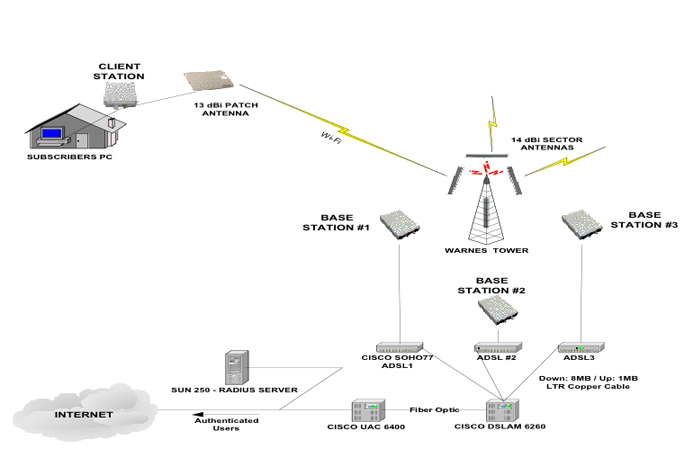
|
|
|
|
|
|

